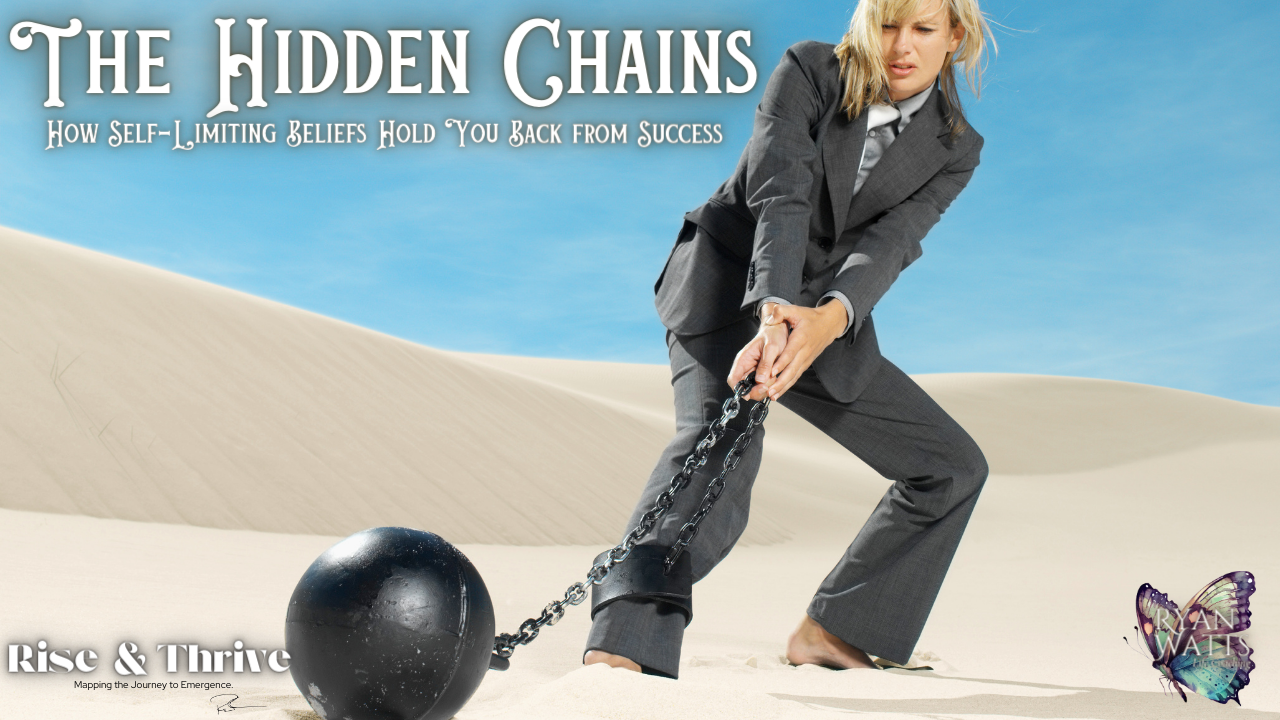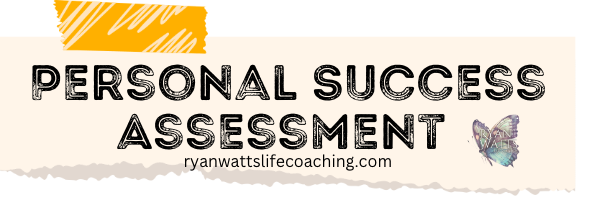The Hidden Chains: How Self-Limiting Beliefs Hold You Back from Success
Jul 13, 2023
The hidden source of our bondage...
"I'm not good enough."
"I'm unworthy of love."
"I don't deserve success."
"Money is evil."
"I can't change."
"I'm a failure."
"I'm too old/young."
"I must please everyone."
"Success comes only through luck."
"I'm not creative."
"I don't deserve happiness."
"I'll never find true love."
"I have to be perfect."
"It's too late to start."
"Money doesn't grow on trees."
"I'm not smart enough."
"I can't trust others."
"I'll always be alone."
"I don't deserve good health."
"Success is for others, not me."
Beliefs = Reality1
Beliefs equal your reality. Not the other way around. Limiting beliefs are often invisible barriers blocking our path to success. Limiting beliefs are deeply ingrained thoughts and perceptions that constrain our actions, decisions, and overall mindset. They often revolve around themes such as self-worth, success, relationships, and personal capabilities.
Limiting beliefs have underlying causes rooted in past experiences, upbringing, or societal influences. It's essential to delve deeper and identify the origins of these beliefs. Were they formed through negative experiences, criticism, or comparisons to others?
Limiting beliefs hinder personal and professional growth, limits our ability to take risks, and negatively impacts our self-esteem and relationships.
Why do we all struggle with limiting beliefs?
We'll explore the four reasons.
Cognitive Biases
Cognitive biases play a vital role in the formation of limiting beliefs. Our brains have evolved to be calorically efficient. In other words, they use mental shortcuts, leading to distorted thinking patterns.
Two cognitive biases are relevant to limiting beliefs. Confirmation bias and selective attention. Confirmation bias causes us to seek information confirming our existing beliefs while ignoring contradictory evidence. Selective attention leads us to focus on information that aligns with our preconceived notions, reinforcing our limiting beliefs.2
Childhood Experiences and Conditioning
Our childhood experiences shape our beliefs about ourselves and the world around us. Negative experiences, criticism, or repeated failures can contribute to the development of limiting beliefs. For example, a person who faced repeated rejection in their career might develop the belief that they are not worthy of success. Conditioning from parents, teachers, or societal norms can also reinforce self-limiting beliefs, perpetuating a cycle of negative thinking.3
Perception of Self
Our emotions and self-image influence the development of limiting beliefs. Negative emotional experiences can create associations between certain situations and self-limiting beliefs. For example, if someone experiences embarrassment during a public speaking event, they might develop the belief that they are not good at public speaking. This may not be objectively true. Additionally, our self-image, which includes how we perceive ourselves and what we believe about our capabilities, can reinforce limiting beliefs creating a loop reinforcing the negative belief.4
Rejection
Fear of failure and rejection may result in the formation of limiting beliefs. The fear of stepping outside our comfort zones and facing potential setbacks or criticism can lead us to play it safe and maintain the status quo. IE do what we've always done, staying in our comfort zone. This fear of failure can fuel beliefs such as "I'm not good enough" or "I'll never succeed," preventing us from taking risks and pursuing our goals!5
Uncover The Virus
Self-limiting beliefs are hard to identify. Here are some ways to discover them:
First, use powerful questions. Some examples include:
-
- What beliefs do I hold about myself, my capabilities, and my potential?
- Are these beliefs empowering or limiting?
- What evidence supports or contradicts these beliefs?
- How do these beliefs impact my actions, choices, and goals?
- What alternative beliefs could be more supportive and empowering?
Next, identify "Should" statements. These often reveal underlying beliefs about how you should be or what you should achieve. Reflect on where these expectations come from and whether they align with your true values and aspirations or if they are based on societal or cultural norms.
Third, uncover your unconscious beliefs. Self-limiting beliefs can sometimes operate unconsciously, meaning we may not be fully aware of them. Engage in techniques such as free writing, automatic writing, or expressive arts to tap into your subconscious mind and bring hidden beliefs to the surface. Pay attention to any insights, symbols, or emotions that arise during these processes.
Finally, work with a coach or counselor to identify self-limiting beliefs and rediscover possibilities.
To schedule your FREE LIMITING BELIEF SESSION, Click here.
And to download your Personal Success Assessment, click below!
References
- Balcetis, E., & Dunning, D. (2010). Wishful seeing: More desired objects are seen as closer. Psychological Science, 21(1), 147-152.
- Nickerson, R. S. (1998). Confirmation bias: A ubiquitous phenomenon in many guises. Review of General Psychology, 2(2), 175–220.
- Bandura, A. (1977). Self-efficacy: Toward a unifying theory of behavioral change. Psychological Review, 84(2), 191–215.
- Rogers, C. R. (1959). A theory of therapy, personality, and interpersonal relationships, as developed in the client-centered framework. In S. Koch (Ed.), Psychology: A Study of a Science. Vol. 3: Formulations of the Person and the Social Context. McGraw-Hill
- Zuckerman, M., & Tsai, F. F. (2005). Costs of self-handicapping. Journal of Personality, 73(2), 411–442
Get Yours Now!
Discover the true meaning of success with our exclusive guide: Defining Your Success Worksheet.
Dive into thought-provoking questions designed to uncover your unique path to fulfillment. Don't chase shadows; define and achieve a success that resonates with your core values and aspirations.
Subscribe now and start forging your journey to success with clarity and purpose.
We hate SPAM. We will never sell your information, for any reason.


